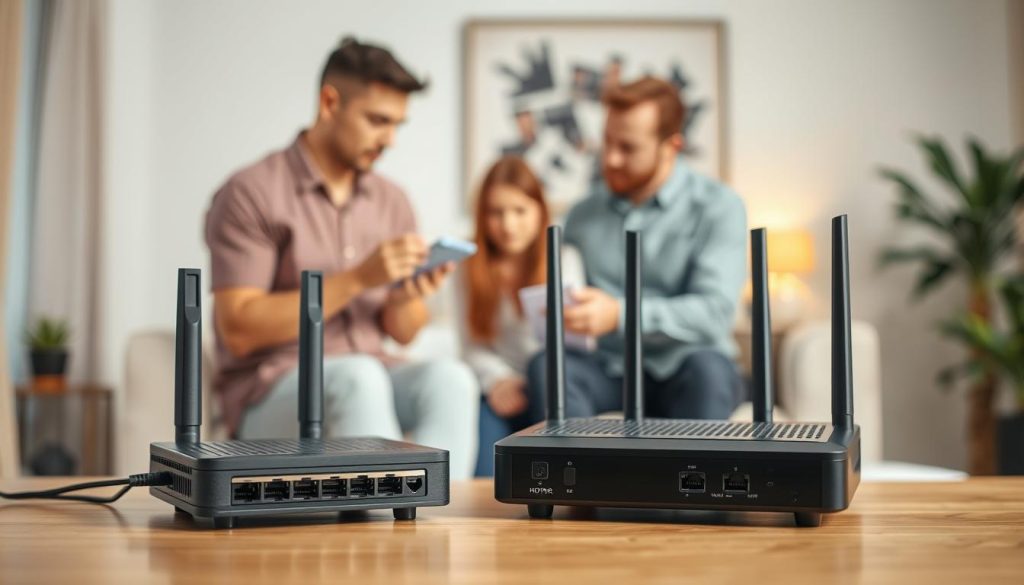Keeping your home network safe is key in today’s world. You might ask if you need both a router and a firewall to keep your online activities safe. It’s important to know how these tools work to protect your home network security and cybersecurity essentials.
A router links your devices to the internet. On the other hand, a firewall guards your network from threats. Having both can greatly boost your cybersecurity. This article will dive into the differences between routers and firewalls. It will also show how they work together to make your home network safe.
Key Takeaways
- Routers and firewalls serve different purposes in home network security.
- A router connects devices to the internet.
- A firewall protects your network from potential threats.
- Using both enhances your cybersecurity.
- Understanding their differences is crucial for a secure home network.
Understanding the Basics of Networking Devices
Setting up your home network? Knowing about networking devices is key for security and efficiency. These devices help your devices talk to each other and the internet.
What is a Router?
A router manages your network’s traffic. It sends data packets to their right places, whether on your network or the internet. Routers are key for sharing internet among devices.
There are many types of routers, like wireless ones that offer Wi-Fi. When picking a router, think about your home size, how many devices you’ll connect, and what you’ll use the internet for.
What is a Firewall?
A firewall is a barrier that keeps your devices safe from spam and threats. It checks data packets and blocks harmful ones. Firewalls are vital for network protection, keeping your devices and data safe.
Firewalls can be hardware or software. They’re often in routers or on devices. Both are important for network and device safety.
How Do They Work Together?
Routers and firewalls make your home network safe and efficient. Routers handle traffic, while firewalls block threats. Often, they work together, with the router directing traffic and the firewall checking for threats.
To see how they work together, look at this table:
| Device | Primary Function | Key Benefits |
|---|---|---|
| Router | Manages network traffic | Shares internet connection, directs data packets, provides Wi-Fi connectivity |
| Firewall | Filters data for security | Blocks malicious software, protects against unauthorized access, safeguards data |
Understanding how routers and firewalls work together is important. It shows how each device keeps your network safe and efficient. Next, we’ll dive deeper into their roles.
The Importance of a Router in Your Home
Understanding the role of a router in your home is key to better network performance and security. A router lets many devices share one internet connection. It’s a vital part of modern home networks.
Connecting Devices to the Internet
A router’s main job is to connect devices to the internet. It serves as a gateway for devices like laptops, smartphones, and smart home gadgets. This way, they can access online resources.
By managing network traffic, a router makes sure data moves smoothly between devices and the internet. This is crucial when many devices are online at the same time.
Managing Bandwidth and Speed
Routers are key in managing bandwidth and speed. They optimize network resources to meet the needs of different devices and apps. This keeps your internet connection stable and fast, even with many devices connected.
Some routers have Quality of Service (QoS) features. These let you set priorities for certain devices or apps. This is great for activities that need lots of bandwidth, like gaming or streaming.
Offering Wi-Fi Coverage
A router also provides Wi-Fi coverage in your home. Modern routers support Wi-Fi 6, which boosts range and speed. By placing your router right, you can get a strong and reliable Wi-Fi signal everywhere.
| Router Feature | Description | Benefit |
|---|---|---|
| Dual-Band/Wi-Fi 6 | Supports multiple Wi-Fi standards | Faster speeds and better range |
| Quality of Service (QoS) | Prioritizes network traffic | Improved performance for critical applications |
| MU-MIMO Technology | Handles multiple device connections | Enhanced network efficiency |
When picking a router, think about your home’s size, the number of devices, and your online activities. The right router ensures a secure home network that fits your needs.
The Role of a Firewall in Home Security
A firewall is key in keeping your home network safe from cyber threats. It controls traffic by setting rules. This way, it blocks threats from reaching your network.
Types of Firewalls: Software vs. Hardware
Firewalls come in two types: software and hardware. Software firewalls are programs on your devices. They watch and control traffic based on rules. Hardware firewalls are physical devices, like routers, that protect your whole network.
Here’s what sets software and hardware firewalls apart:
- Scope of Protection: Software firewalls guard individual devices. Hardware firewalls protect your whole network.
- Ease of Use: Hardware firewalls are simpler to set up for network-wide protection. Software firewalls need setup on each device.
- Performance Impact: Software firewalls can slow down devices. Hardware firewalls usually don’t slow things down.
Protecting Against Cyber Threats
Firewalls are vital for keeping your home network safe from cyber threats. They block hackers, malware, and unauthorized access. By filtering traffic, they lower the risk of network breaches.
Firewalls protect your network in several ways:
- They block unwanted incoming connections.
- They control outgoing connections to stop malware from talking to its creators.
- They filter traffic based on rules to keep malicious data out.
Customizing Security Settings
To get the most out of your firewall, you need to tweak its settings. This means setting up rules for traffic, making exceptions for trusted apps, and watching for suspicious activity.
When adjusting your firewall settings, keep these tips in mind:
- Start with the default settings and tweak them as needed.
- Make rules for specific traffic types.
- Check firewall logs often to catch and handle threats.
Key Differences Between a Router and a Firewall
Routers and firewalls are key parts of your home network. Routers connect your devices to the internet. Firewalls protect your network by controlling traffic.
Primary Functions and Features
A router’s main job is to manage internet traffic. It makes sure data gets to the right place. A firewall’s role is to block unwanted access to your network.
Routers have features like Wi-Fi and Quality of Service (QoS). Firewalls offer security like intrusion detection and VPN support.

Performance Impact on Your Network
Routers and firewalls can change how your network works. Routers can affect your internet speed. Firewalls can slow down data handling.
Choosing the right router and firewall is important. They should work well together. This ensures your network is fast and secure.
Cost Comparisons
Routers and firewalls have different prices. Basic routers start at $20. Advanced ones can cost over $300. Firewalls can range from $100 to thousands, based on their features.
| Device | Basic Features | Advanced Features | Price Range |
|---|---|---|---|
| Router | Wi-Fi, Ethernet ports | QoS, MU-MIMO, Wi-Fi 6 | $20 – $300+ |
| Firewall | Basic traffic filtering | Intrusion detection, VPN | $100 – $1000+ |
Knowing the differences helps you choose the best for your network. The right router and firewall ensure a fast, secure internet connection.
Do You Really Need a Separate Firewall?
When setting up a secure home network, you might wonder if you need a separate firewall. Knowing how a firewall works is key to keeping your network safe.
Scenarios for Home Users
Most home users get by with their router for basic needs. But, some situations call for a separate firewall.
- Multiple devices connected to the network
- Handling sensitive information (e.g., financial data, personal documents)
- Frequent online transactions or banking
- Presence of IoT devices that may be vulnerable to hacking
Experts say using a layered security approach is best. They suggest having separate devices for better security. A dedicated firewall adds an extra layer of protection against cyber threats.
When to Consider Extra Security
If you’re in any of these situations, it’s time to think about extra security. This includes getting a separate firewall:
- You’ve had a cyber attack or data breach before.
- You have a complex home network with many sub-networks.
- You work from home and handle sensitive company data.
Rob Sheldon, a cybersecurity expert, says, “A separate firewall is crucial for homes with many devices and sensitive data.”
“The best network security solutions often involve a combination of hardware and software firewalls to provide comprehensive protection.”
Benefits of a Dedicated Firewall
A dedicated firewall brings several advantages, including:
| Benefit | Description |
|---|---|
| Enhanced Security | Provides an extra layer of protection against cyber threats. |
| Improved Performance | It can make your network run better by taking some tasks off your router. |
| Customization | You can set up more detailed security settings and configurations. |
When picking a firewall, look at ease of use, if it works with your router, and how secure it is. Options include hardware firewalls from Cisco or WatchGuard, and software like Norton Security.
Understanding your needs and considering a dedicated firewall can greatly improve your home network’s security and performance.
How to Choose the Right Router for Your Needs
Choosing the right router is key for home internet safety and network protection. With many options, knowing what to look for is important.
Factors to Consider: Speed, Range, Budget
Several factors are important when picking a router. Speed is crucial for supporting all your devices. A good range is needed for coverage in large homes or with many devices. Your budget also plays a role in the router you can buy.
A router with at least 1000 Mbps (1 Gbps) speed is recommended for most homes. For very large homes or lots of devices, you might need a more powerful router. The range should cover your entire home.
Popular Router Brands and Models
Many brands are known for quality routers. Netgear, TP-Link, and Linksys are among the most popular. Look for features like dual-band or tri-band, Quality of Service (QoS) settings, and Ethernet ports.
- Netgear offers a range of routers known for their performance and features.
- TP-Link routers are often praised for their affordability and reliability.
- Linksys routers are popular for their ease of use and robust security features.
Wireless vs. Wired Options
The debate between wireless and wired routers continues. Wireless routers are great for mobile devices and homes with many Wi-Fi devices. But, wired routers or Ethernet connections are more stable and secure for critical use.
Many routers offer both wireless and wired options. This lets you choose the best connection for your devices. Think about your specific needs and the devices you use most.
By considering these factors and your needs, you can pick a router that boosts your cybersecurity essentials and gives a reliable internet connection at home.
Top Firewall Options for Home Users
In today’s world, a strong firewall is essential for home users. It’s important to know the different types of firewalls and their benefits. This knowledge helps protect your home network.
Recommended Models for Different Budgets
Choosing a firewall depends on your budget. There are great options for every price range. For a budget-friendly choice, the Ubiquiti Dream Machine is a good option. It balances cost and performance well.
If you’re willing to spend more, the Fortinet FortiGate series offers advanced security. Remember, the cost of not having security can be higher in the long run.
As “The security of your network is only as strong as its weakest link.”
Software Solutions for Enhanced Protection
Software firewalls add an extra layer of security. Programs like Norton Security and McAfee Total Protection protect against many cyber threats. They’re great for securing multiple devices or for those needing advanced security.
- Real-time threat detection
- Intrusion prevention systems
- Network monitoring and alerts
When picking a software firewall, choose features that meet your needs. Make sure it works with your devices.
Installing and Configuring Your Firewall
After choosing your firewall, proper setup is crucial. Follow the manufacturer’s instructions for installation. Most modern firewalls have easy-to-use interfaces.
“A well-configured firewall is your first line of defense against cyber threats.”
After setting it up, customize your firewall settings. This includes setting rules for traffic, configuring VPN, and enabling parental controls.
| Feature | Hardware Firewall | Software Firewall |
|---|---|---|
| Installation | Typically straightforward, often plug-and-play | Requires download and installation on each device |
| Security Features | Network-level protection, often with advanced features | Device-level protection, with real-time threat detection |
By understanding your options and choosing the right firewall, you can greatly improve your security. This protects your digital life.
Best Practices for Home Networking Security
Securing your home network is key in today’s digital world. With more devices online, keeping your network safe is vital. A secure network guards your personal info and stops unauthorized access.

Regular Updates and Maintenance
It’s crucial to keep your router and devices updated for cybersecurity essentials. Updates patch security holes found since the last update. To keep your secure home network, turn on auto-updates for your router and devices.
- Check for firmware updates at least once a month.
- Enable automatic updates for your operating system and software.
- Update the firmware on your router and other network devices regularly.
Setting Strong Passwords
Using strong, unique passwords is key for home network security. Weak passwords can be guessed by hackers, letting them into your network. Make sure your passwords are complex and not used elsewhere.
- Use a mix of uppercase and lowercase letters.
- Include numbers and special characters in your passwords.
- Avoid using easy-to-guess info like your name or birthdate.
Monitoring Your Network Traffic
Watching your network traffic helps spot and handle security threats. By monitoring devices on your network, you can catch odd activity early.
“The key to maintaining a secure home network is vigilance and regular maintenance.”
To keep an eye on your network, try these steps:
- Use your router’s admin interface to see connected devices.
- Set up alerts for new device connections.
- Regularly check your network’s activity logs.
By sticking to these tips, you can boost your home network security and safeguard your digital world from threats.
Conclusion: Finding the Right Balance for Your Home
It’s key to know how routers and firewalls work to keep your network safe and fast. These devices play different roles in protecting your home network.
Assessing Your Home Network Needs
Think about how many devices are on your network and how much security you need. If you have lots of devices and important data, you might need a firewall to help your router.
Selecting the Right Internet Security Devices
When picking security devices, look at how well they work, their cost, and how easy they are to use. Brands like Cisco and Netgear have many options that fit different needs.
Staying Ahead in Home Networking and Security
New tech like Wi-Fi 6 and AI will change home networking and security. Keeping up with these trends will help you protect your network better.

